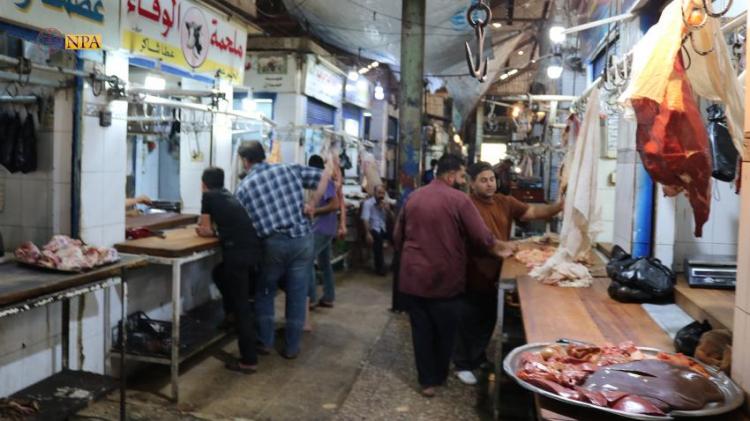With ups-downs of the Syrian pound against the dollar, the decline of purchase of meat
Qamishli – North-Press Agency
Ibrahim Ibrahimi
Meat prices have risen in the markets of the city of Qamishli, northeastern Syria, due to the swaying value of the Syrian pound against the dollar, which led to a decline in the daily consumption of meat.
Citizen Omar Hamid who works in the butchers’ market in the city of Qamishli, told North-Press, while wondering: “People tell us the dollar has risen, what does it have to do with meat? If sheep were the same ones before the dollar rise!”
There are about 55 shops in the market of butchery in Qamishli, where its establishment goes back to the era of the French Mandate on Syria, the market did not suffer from the decline in working levels as it has been happening recently, according to the butchers in the market.
The butcher Abdulaziz Muhammad, a shopkeeper in the market of butchery, told North-Press that before the rise of the prices, butchers in this market were slaughtering about 200 sheep and cattle on a daily basis, but now they are only slaughtering almost 50 sheep.
“Apart from the high dollar exchange rate, there is another reason for the high cost of meat, which is the export and smuggle of meat to outside northern Syria”, Muhammad added.
As a result of the decline of the purchase, the high prices of meat also led to less selling quantities, one kilogram of lamb meat is sold to citizens for 5-6 thousand Syrian pounds (about $8-10), while a kilogram of beef meat is sold for 4,500 Syrian pounds ($7,5).
“If the wholesale price of one kilogram of meat today is 4,700 Syrian pounds (about $8), then, at what price shall we sell it to the citizen? That’s why most of the shops have stopped working”, butcher Miyassar Ali said.
For his part, butcher Jihad Hamdo commented on the prices, the purchase and sale movement, by saying: “Until now we have not opened the selling, How would people buy at high costs? They say the dollar has risen, so the prices of all of the items have risen as well, even the meat, and citizens can no longer buy it”.
The Syrian markets have recently witnessed an unprecedented frequency in the exchange rate of the dollar against the Syrian pound, where the value of the dollar rose to record levels, before falling significantly again, causing a rise in the prices of all materials.
The head of money exchangers in al-Jazira region Walid Ali, reasoned the rise of the dollar to “the decision of the Central Bank in Damascus,” as he told North-Press, which reflected in turn on the rise and deterioration of the prices of basic food items, including meat.

